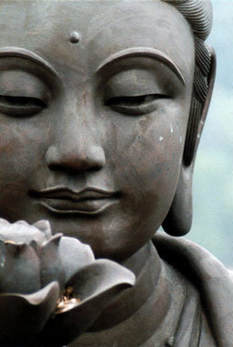To the mind that is still, the whole universe surrenders. - Lao Tzu
Mindfulness: What is it?
|
Simply put, Mindfulness is the practice of paying attention to one's direct experience in the present moment, with a sense of openness, curiosity and willingness to be with your experience, as it is. In short, mindfulness brings us closer to the truth of things, just as they are. Influenced by ancient eastern wisdom traditions, mindfulness and meditation were used as powerful practices for cultivating self awareness, and spiritual development. In modern times mindfulness and meditation are useful practices for cultivating self awareness, relieving stress, developing concentration and focus, physical health and well being and connecting deeply with the direct experience of our lives, whether in personal, professional, social or spiritual settings.
|
Mindfulness as a PRACTICE, STATE and a TRAIT....
|
Practice...The ongoing practice of returning your attention to some element of your direct experience such as your breath, a physical sensation, an emotion/feeling/thought or to some external object such as sound, for the purpose of cultivating concentration and focus, and to more deeply explore how you relate to your experience.
State... A state of awareness (sense of knowing) of and attentiveness (direct focus) to what is happening in the present moment of one's direct experience, which often results from an ongoing intentional practice of mindfulness and meditation. |
Trait... A general orientation toward present attention, a natural disposition and quality of awareness, which often grows out of cultivating frequent states of mindfulness.
How Mindfulness Helps Us...
From quieting the mind to opening the heart, mindfulness is a complete practice for supporting wellness and awareness...through consistent practice, mindfulness can help you cultivate...
|
KINDNESS
CONNECTION SELF ACCEPTANCE CONCENTRATION INNER CALM PRESENCE SELF AWARENESS INSIGHT EMOTIONAL RESILIENCE COMPASSION |
Friendliness, generosity and consideration
Closeness, and engagement with others and with life Fully welcoming and allowing yourself to be as you are, with care and love Focus, curious attention, wise investigation, knowing direct experience Peace of mind, serenity, ease, emotional stability Emotional availability, grounded and attentive, quality of engagement Conscious understanding of emotions, feeling, challenges, personal truths Wisdom, awareness, understanding, discernment, intuitive understanding Adaptability, flexibility, strength, emotional capacity Care, empathy, concern, warmth, sensitivity, tenderness, tolerance, kindness |
The Science of Mindfulness...
|
Among neuroscientists, psychologists and even CEO's , mindfulness is all the rage these days, but what really, is the rage all about? We know it helps cultivate concentration, reduces stress and increases inner peace, but how?
Besides the many psychological, emotional and social benefits, on the most basic scientific level mindfulness practice supports nervous system regulation, healthy brain function and triggers the relaxation response of the body when tension, inflammation or stress are present. Numerous studies from various international research institutions show that mindfulness practice, even just for 20 minutes a day can help restore healthy cortisol level in the bloodstream, a deeper sense of calm and a general feeling of well being. Additional studies have shown that mindfulness practice actually changes the structure and function of the brain, by rewiring reactive/negative thought patterns, and inclining the brain toward more skillful and adaptive response patterns. Abundant scientific research demonstrates that mindfulness supports: Improved physical health Decrease in stress Increase in positive emotions Decrease in inflammation Improved mental health Improved pain tolerance and pain reduction Improved stress response etc. Studies have also shown a direct correlation between mindfulness practice and improved disease recovery & prevention for many conditions, including: Cancer Heart Disease IBS Depression Psoriasis Chronic pain etc. |
History and Classical Teachings...
|
Though taught in a contemporary and often secular context, the practice of mindfulness originates in the ancient classical teachings of Buddhism, as a way to cultivate self awareness and spiritual development, which Siddhartha Gotoma, known to his students as the Buddha, taught, is the doorway to freedom from suffering.
A foundational teaching in the Buddhist cannon is the Four Foundations of Mindfulness, in which mindfulness of the body, feelings/sensations, consciousness/mind, and elements of direct teachings are cultivated or contemplated for the purpose of gaining greater insight and awareness. Additionally, another foundational teaching, from which all other Buddhist teachings evolved are the Four Noble Truths which teach: |
- First, the awareness of suffering and that it exists
- Second, the cause of this suffering is clinging and attachment to our experience... of not seeing the changing nature of reality
- Third, through the study and practice of mindfulness there is the possibility for freedom from this suffering
- Fourth, the pathway to this freedom from suffering is the EightFold Path which includes the following cultivation practices:
- Right Understanding
- Right Thought
- Right Speech
- Right Action
- Right Livelihood
- Right Effort
- Right Mindfulness
- Right Concentration
Through a 2600 year old monastic tradition of monks and nuns, the Buddhist teachings were handed down first through oral tradition, and were then written down about 2000 years ago. In that time, the teachings spread through many different cultural and geographical regions of Asia, taking on the various cultural influences, resulting in what are now known as the three primary branches of Buddhism: Vajrayana, known commonly for Tibetan Buddhism; Thervada known more commonly for Vipassana or Insight Meditation; Mahayana, known commonly for Zen Buddhism. Of course there are many more subsets of the Buddhist teachings, each with rich practices and cultural significance. Each of these branches of Buddhism are still practiced world wide with a vast following of monastic and lay practitioners and students.
Fast forward to Modern times...
Though meditation practice and mindfulness has existed in many different cultures for the last 2600 years, and there is evidence that the Buddhist teachings had many known western followers even as recently as as the 18th century, it was in the 1960's when several young (and now well known) western seekers traveled to and studied the Buddhist teachings in Asia, and were instructed to bring the Buddhist teachings back to the west. Many established eastern teachers were also highly influential. Such teachers as Joseph Goldstein, Jack Kornfield, Sharon Salzberg, Shunryu Suzuki, Robert Aitken, Sylvia Boorstein, Chogyam Trungpa Rinpoche, Pema Chodron, Stephen Batchelor and Joan Halifax, in addition to many contemporary monastic teachers from diverse lineages have been instrumental in introducing the Buddhist teachings to a western audience in ways that resonate culturally, socially, emotionally and psychologically.
With the teachings adapted to meet the needs of the western mind and psyche (with a very strong overlay of western psychology), Western Buddhism has emerged as what could be considered a new fourth branch of the Buddhist teachings, and has, even in it's infancy, already taken root as a thriving spiritual practice and tradition.
With the teachings adapted to meet the needs of the western mind and psyche (with a very strong overlay of western psychology), Western Buddhism has emerged as what could be considered a new fourth branch of the Buddhist teachings, and has, even in it's infancy, already taken root as a thriving spiritual practice and tradition.
A case for secular mindfulness...
|
As the classical Buddhist teachings merged with modern western culture and the natural curiosity of the innovative mind, a case was made for secular mindfulness as the next wave of inquiry and exploration. In the 1970's John Kabat-Zinn, a Zen Buddhist practitioner and a molecular biologist and researcher hypothesized the efficacy of mindfulness practice on chronic and acute health conditions. He created a mindfulness program now known as Mindfulness Based Stress Reduction (MBSR) based on the idea of participatory medicine, in which patients take on a rather significant and active role in their own healing and well being, and are responsible for doing the kind of personal work which allows then to access their own internal resources of healing, learning and transformation.
|
SInce it's inception at the university of Massachusetts in 1979, MBSR has expanded to hundreds of medical centers, universities, and corporate centers world wide, and has given rise to such programs as Mindfulness Based Cognitive Therapy (MBCT), Mindfulness Based Relapse Prevention (MBRP), among many others.
Additionally, mindfulness and its impact on health and wellbeing has become a quickly growing subject of scientific research world wide. It has been consistently shown that mindfulness based practices and interventions yield positive and growth promoting outcomes in a diverse range of medical, clinical, organizational, therapeutic and educational settings. Now, mindfulness programs can be found in organizations and institutions world wide, to support people of diverse populations ace hive greater levels of heath, wellbeing, awareness and concentration.
Additionally, mindfulness and its impact on health and wellbeing has become a quickly growing subject of scientific research world wide. It has been consistently shown that mindfulness based practices and interventions yield positive and growth promoting outcomes in a diverse range of medical, clinical, organizational, therapeutic and educational settings. Now, mindfulness programs can be found in organizations and institutions world wide, to support people of diverse populations ace hive greater levels of heath, wellbeing, awareness and concentration.
Become a woman of presence!
|
Sign up for news
& events |
Power in being Present!
Stories of mindfulness, women & awakening |
Schedule a free
intro call |
PRESENCE Mindfulness & Coaching . Nichole Proffitt . [email protected] . 510-612-6211







